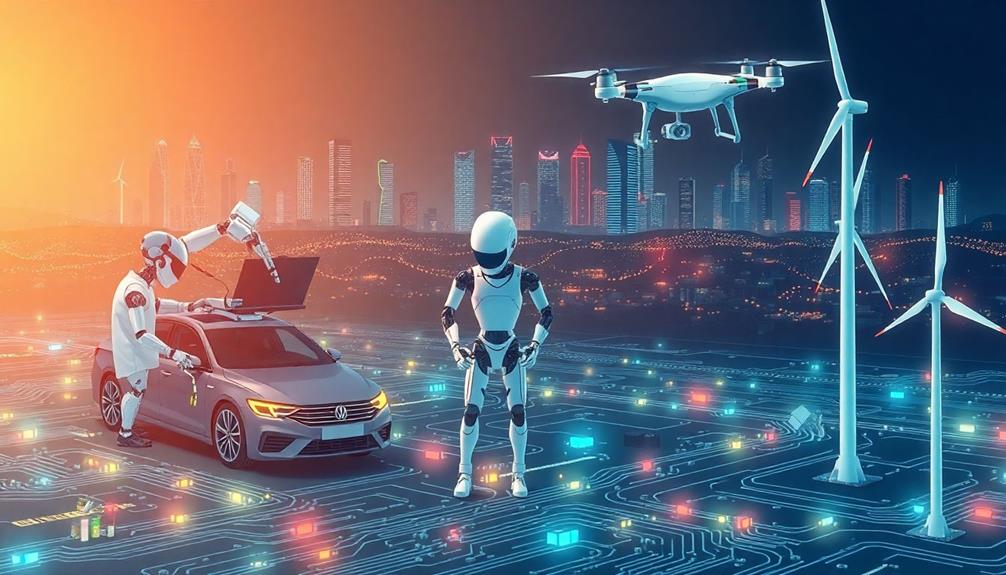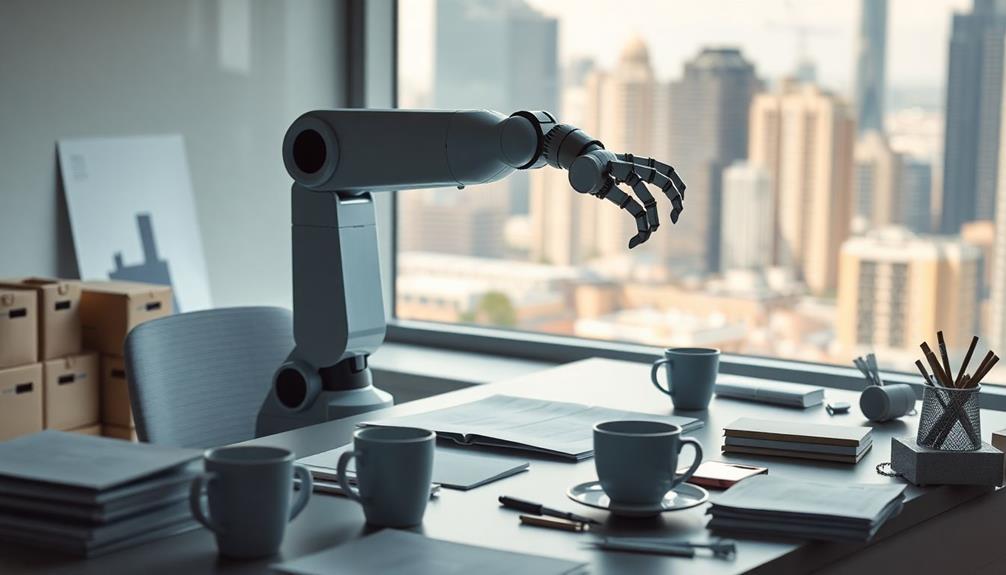You're likely familiar with the buzz around AI, but have you stopped to ponder how it's quietly revolutionizing the way you work? As AI takes over routine tasks, you'll be freed up to focus on the creative problem-solving and emotional intelligence that sets humans apart. But what does this mean for your job, and the industry you're in? The truth is, AI is reshaping entire sectors, from manufacturing to healthcare, and it's only the beginning. You'll want to examine how this shift will impact your career and the skills you'll need to thrive in an AI-driven future.
Key Takeaways
- AI is transforming industries by automating mundane tasks, enhancing precision, and increasing productivity, leading to significant changes in job roles and required skills.
- New career paths are emerging in data analysis, machine learning, AI programming, and system management, with data scientists and AI specialists in high demand.
- AI-powered chatbots and virtual assistants are augmenting traditional roles, increasing customer satisfaction by up to 24% and freeing human staff for complex issues.
- Emotional intelligence and soft skills will become essential for working effectively alongside AI technologies, as automation takes over routine functions.
- About 45% of today's work activities can be automated, and this number is expected to rise as AI continues to advance, reshaping the future of work.
AI's Impact on Job Roles
As AI transforms industries, you're witnessing a seismic shift in job roles, with traditional positions evolving and new ones emerging to capitalize on the technology's potential.
AI is augmenting existing roles, automating mundane tasks, and enabling you to focus on meaningful work. For instance, AI-powered chatbots and virtual assistants are augmenting traditional roles such as administrative assistants and customer service representatives, which can increase customer satisfaction by up to 24% through instant responses and resolutions to customer inquiries AI chatbots.
Furthermore, AI-powered chatbots can handle up to 80% of routine customer inquiries, freeing up human staff to focus on complex issues and higher-value tasks.
On the other hand, AI is giving rise to entirely new professions and skill sets, requiring workers to adapt to new technologies and workflows. Data scientists and AI engineers are in high demand as organizations seek to harness the power of big data and machine learning algorithms.
Additionally, ethical AI specialists and AI ethicists are emerging as critical roles, tasked with guaranteeing responsible and ethical AI deployment.
As AI continues to evolve, it's vital to understand its implications on the labor market and verify its deployment is beneficial, not harmful.
Industries Undergoing Transformation

Frequently, AI's transformative power is most evident in industries where manual processes and human error can have significant consequences. As you explore the impact of AI, you'll notice that certain industries are undergoing significant transformations.
| Industry | Transformation |
|---|---|
| Manufacturing | Enhanced precision, reduced errors, and increased productivity through robots and AI-powered systems. |
| Retail | AI-driven customer service chatbots and personalized shopping experiences, leading to increased customer satisfaction and loyalty. |
| Logistics & Transportation | Automation transforming operations, making them more streamlined and cost-effective, with AI-powered systems optimizing routes, managing inventory, and predicting demand. |
| Healthcare | AI leveraging machine learning algorithms to assist medical professionals in diagnosis, treatment planning, and personalized medicine, leading to improved patient outcomes and healthcare delivery. |
These industries are being reshaped by artificial intelligence, automation, and machine learning algorithms. As AI continues to evolve, its impact on supply chain management, for instance, will be significant. You'll see more efficient and streamlined operations, reducing errors and increasing productivity. The future of work is being rewritten, and understanding these transformations is vital for you to navigate the changing landscape.
The Rise of New Skill Sets
The intersection of human capabilities and AI technologies is giving rise to a new generation of skill sets, where technical expertise converges with soft skills to drive innovation and growth.
As you prepare for the future of work, you'll need to develop a unique blend of skills that complement AI technologies. Technical skills like coding, data analysis, and machine learning will be highly valued, with data scientists and AI specialists in high demand.
However, it's not just about technical expertise; soft skills like creativity, emotional intelligence, and problem-solving will be essential for working effectively alongside AI technologies. The ability to work with AI chatbots and other AI-powered tools will also become increasingly important.
Additionally, AI is used in mobile app development to create personalized user experiences and improve app functionality, making it essential to understand how to leverage these technologies.
To succeed, you'll need to manage teams, lead innovation, and build relationships, making critical decisions and providing creativity and innovation. Emotional intelligence will become increasingly important as automation takes over routine functions, allowing humans to focus on tasks that require empathy, compassion, and social skills.
As new roles emerge, requiring collaboration with AI technologies, you'll need to stay ahead of trends through lifelong learning, developing, managing, and improving these systems.
Automating Mundane Tasks Efficiently

You'll find that AI's ability to automate mundane tasks efficiently is a game-changer for productivity.
By taking over repetitive tasks, AI-powered automation can increase productivity by up to 30%, freeing you to focus on more complex and creative tasks.
In the manufacturing sector, AI-driven robots are streamlining production lines, optimizing supply chain management, and enhancing quality control processes, resulting in a 25% reduction in errors and waste.
Additionally, AI-powered backlink tools can analyze millions of backlinks, identify patterns, and provide actionable insights for link building strategies, categorizing and prioritizing backlinks to optimize WordPress SEO strategy.
AI algorithms can automate up to 80% of data entry tasks, reducing the time spent on manual data processing and allowing you to focus on higher-value tasks such as data analysis and strategy development.
Additionally, AI-powered chatbots can reduce response times by up to 90% by automating routine customer service inquiries, leading to improved customer satisfaction and loyalty.
Navigating AI-Driven Change
About 45% of today's work activities can be automated, and this number is expected to rise as AI continues to advance.
As you navigate this AI-driven change, it is crucial to understand the implications of automation on the future of work. AI has transformed business operations through process automation, providing valuable insights for decision-making.
New career paths are emerging in data analysis, machine learning, AI programming, and system management, with data scientists and AI specialists in high demand.
To stay ahead, you'll need to integrate AI tools into business strategies, requiring collaboration with AI technologies and continuous learning to keep pace with technological advancements. Emotional intelligence will become increasingly important as automation takes over routine functions, and human workers will be needed to make critical decisions, interpret complex data, and provide creativity and innovation.
Frequently Asked Questions
How Is AI Reshaping Industries?
You're probably thinking AI is just a fancy buzzword, but it's quietly revolutionizing industries like manufacturing, healthcare, and finance by automating tasks, enhancing precision, and improving productivity, transforming the way you work and live.
How AI Is Shaping the Future of Work?
You're witnessing AI revolutionize the workforce, augmenting your skills by automating mundane tasks, freeing you to focus on creative problem-solving, and amplifying productivity, all while creating new job opportunities that require human expertise and innovation.
What Is the Future of AI in Industry?
As you navigate the trajectory of AI in industry, you're poised to uncover a landscape of precision, where machines harmonize with human expertise, and tasks are streamlined, freeing you to focus on innovation and high-value decision-making.
How Is AI Shaping the Future?
You're witnessing AI shape the future by revolutionizing traditional processes, driving efficiency, and unleashing innovation across industries, leading to increased productivity, new professions, and a need for workers to adapt to new technologies and acquire new skills.
Conclusion
As you navigate the future of work, remember that AI is not replacing humans, but augmenting their capabilities. In fact, a staggering 80% of executives believe AI will create new job opportunities (Forbes). By embracing AI-driven automation, you'll tap into more time for creative problem-solving and high-value tasks. So, focus on developing skills like emotional intelligence and data analysis to thrive in this new landscape. The future of work is here – are you ready to adapt and excel?

